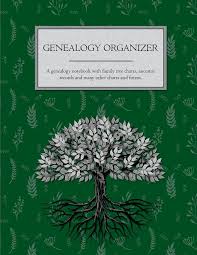Exploring Your Roots: Essential Genealogy Supplies for Every Family Historian
The Essential Genealogy Supplies Every Family Historian Needs
Embarking on a journey to uncover your family history is an exciting and rewarding experience. To help you along the way, having the right genealogy supplies at your disposal can make a significant difference in organizing and preserving your findings.
Here are some essential genealogy supplies that every family historian should have:
- Genealogy Software: Invest in quality genealogy software to help you organize, store, and analyze your family tree data efficiently.
- Archival-Quality Paper: Use acid-free paper and document sleeves to protect vital records, photos, and documents from deterioration over time.
- Research Logs: Keep detailed research logs to track your progress, sources consulted, and next steps in your genealogical research.
- Census Forms: Print out blank census forms to record information about your ancestors from various census years.
- Pens and Pencils: Have a set of archival-quality pens and pencils for taking notes, labeling documents, and filling out forms.
- Magnifying Glass: A magnifying glass can be handy for examining small details on old documents or faded handwriting.
- Storage Boxes: Use acid-free storage boxes to organize and protect family heirlooms, photos, letters, and other precious artifacts.
- Digital Scanner: A digital scanner allows you to create high-quality digital copies of documents and photos for easy sharing and preservation.
By equipping yourself with these essential genealogy supplies, you can enhance your research process, preserve valuable family history materials, and create a lasting legacy for future generations to enjoy.
Essential Genealogy Supplies: 6 Tips for Effective Family History Research
- Invest in a high-quality genealogy software for organizing and storing your research findings.
- Purchase archival-quality acid-free paper and storage materials to preserve important documents and photos.
- Use color-coded folders or labels to categorize different branches of your family tree for easy reference.
- Consider investing in a DNA testing kit from reputable companies to uncover more about your ancestry.
- Acquire a good quality scanner or camera to digitize old photos, documents, and memorabilia for safekeeping.
- Join genealogy societies or online forums to connect with other researchers and gain access to valuable resources.
Invest in a high-quality genealogy software for organizing and storing your research findings.
Investing in a high-quality genealogy software is a crucial step for any family historian looking to efficiently organize and store their research findings. With advanced features designed specifically for genealogical research, such software can help streamline the process of building and maintaining your family tree, as well as analyzing and visualizing complex relationships. By centralizing your data in a digital format, you can easily access and update information, collaborate with other researchers, and ensure the long-term preservation of your valuable genealogical discoveries.
Purchase archival-quality acid-free paper and storage materials to preserve important documents and photos.
When delving into genealogical research, it is crucial to invest in archival-quality acid-free paper and storage materials to safeguard vital documents and photos for future generations. By using these specialized supplies, you can prevent deterioration and ensure the long-term preservation of your family’s history. Protecting these valuable artifacts with proper archival materials not only maintains their integrity but also allows you to pass down a rich and well-preserved legacy to descendants seeking to connect with their roots.
Use color-coded folders or labels to categorize different branches of your family tree for easy reference.
To enhance organization and streamline your genealogical research, consider utilizing color-coded folders or labels to categorize different branches of your family tree. Assigning specific colors to each branch can provide a visual aid that simplifies navigation through your records and documents. By implementing this method, you can easily identify and access information related to specific family lines, making it convenient to track relationships and uncover connections within your genealogy research.
Consider investing in a DNA testing kit from reputable companies to uncover more about your ancestry.
Consider investing in a DNA testing kit from reputable companies to uncover more about your ancestry. DNA testing can provide valuable insights into your family history, ethnicity, and potential connections with distant relatives. By exploring your genetic heritage, you may discover new branches of your family tree and gain a deeper understanding of your roots. These DNA testing kits offer a fascinating way to complement traditional genealogical research and expand your knowledge of where you come from.
Acquire a good quality scanner or camera to digitize old photos, documents, and memorabilia for safekeeping.
Acquiring a good quality scanner or camera is a crucial tip for genealogy enthusiasts looking to preserve their family history. By digitizing old photos, documents, and memorabilia, you not only safeguard these precious artifacts from deterioration but also make them easily accessible for future generations. With a high-quality scanner or camera, you can capture every detail and nuance of your family’s past, ensuring that the stories and memories contained within these items are preserved for years to come.
Join genealogy societies or online forums to connect with other researchers and gain access to valuable resources.
Connecting with other researchers and accessing valuable resources is essential for advancing your genealogical research. By joining genealogy societies or participating in online forums, you can tap into a wealth of knowledge, expertise, and support from fellow enthusiasts. These platforms provide opportunities to exchange ideas, seek advice, and collaborate on challenging research projects. Additionally, being part of a community of like-minded individuals can offer new perspectives, insights, and access to specialized resources that can propel your genealogical journey to new heights.

